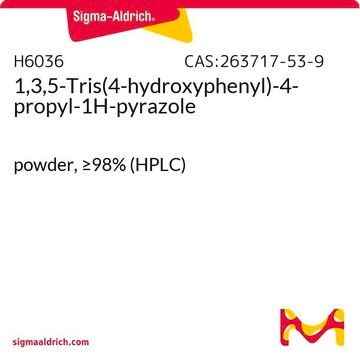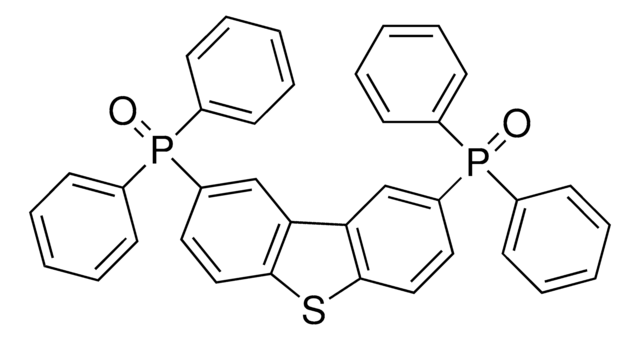H5915
2,3-Bis(4-hydroxyphenyl)propionitrile
≥98% (HPLC)
Sinónimos:
DPN, Diarylpropionitrile, SC-4473
About This Item
Productos recomendados
sterility
non-sterile
Quality Level
assay
≥98% (HPLC)
form
powder
storage condition
desiccated
color
white to beige
solubility
DMSO: 10 mg/mL, clear
shipped in
ambient
storage temp.
−20°C
SMILES string
Oc1ccc(CC(C#N)c2ccc(O)cc2)cc1
InChI
1S/C15H13NO2/c16-10-13(12-3-7-15(18)8-4-12)9-11-1-5-14(17)6-2-11/h1-8,13,17-18H,9H2
InChI key
GHZHWDWADLAOIQ-UHFFFAOYSA-N
Biochem/physiol Actions
Features and Benefits
signalword
Warning
hcodes
Hazard Classifications
Aquatic Acute 1 - Eye Irrit. 2
Storage Class
11 - Combustible Solids
wgk_germany
WGK 3
flash_point_f
Not applicable
flash_point_c
Not applicable
ppe
dust mask type N95 (US), Eyeshields, Gloves
Certificados de análisis (COA)
Busque Certificados de análisis (COA) introduciendo el número de lote del producto. Los números de lote se encuentran en la etiqueta del producto después de las palabras «Lot» o «Batch»
¿Ya tiene este producto?
Encuentre la documentación para los productos que ha comprado recientemente en la Biblioteca de documentos.
Los clientes también vieron
Artículos
We offers many products related to Nuclear Receptors (Steroids) for your research needs.
We offers many products related to Nuclear Receptors (Steroids) for your research needs.
We offers many products related to Nuclear Receptors (Steroids) for your research needs.
We offers many products related to Nuclear Receptors (Steroids) for your research needs.
Nuestro equipo de científicos tiene experiencia en todas las áreas de investigación: Ciencias de la vida, Ciencia de los materiales, Síntesis química, Cromatografía, Analítica y muchas otras.
Póngase en contacto con el Servicio técnico














